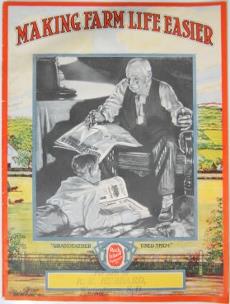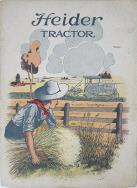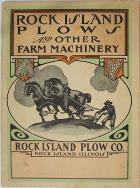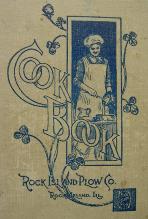




|
Rock Island Plow Co. |
|
A New Name, an Old Company With its restructuring in place, the new Rock Island Plow Company emerged as a more refined machine. Besides the Buford’s, another prominent Rock Island Family took a major stake in the company, namely P.L. Mitchell and his son Phil Mitchell who would serves as a president of the board as well as on the boards of two local banks. Phil Mitchell would also invested $20,000 in funds from the Chippiannock Cemetery of which he was a board member.
One of the new company’s first moves was to increase its advertising campaign. While the old company had produced very little in the way of advertising, instead relying on its agents and word of mouth, the new company pushed out wonderfully illustrated catalogues, pocket guides and a number of trinkets. The company also moved from the simple agent concept to opening branch offices in a number of major cities (one of which would later come be the infamous Dallas School Book Depository).
For the next two decades, the company was very prosperous, expanding into one of the major farm implement companies of the world and claiming such innovations as the frameless sulky plow, the first practical hay loader, and developed the first practical disk harrow by adding scrapers to the blades. Notably, the company made no effort to enter either the steam market or the development of the gas engine/tractor market until Rock Island’s purchase of the “Great Western” line in 1911.
New Ownership, New Direction With the Panic of 1907, money again became an issue and Phil Mitchell divested the Mitchell Family of assets in the company, selling them to the already influential Weyerhaeuser Family, then still of Rock Island. Although best known today as Weyerhaeuser Lumber; in the 1800 and early 1900’s the Weyerhaeuser family was extremely diverse in its ownership of companies, looking for distressed companies and purchasing them at discounted prices. With the purchase of the Mitchell shares, the Weyerhaeuser’s took a controlling interest in the Rock Island Plow Company in 1908. Although they had a controlling share, the family’s management was much like Charles Buford’s in that they took little direct interest in the company’s affairs beyond appointing a caretaker. John .P Weyerhaeuser had a seat on the board as V.P. but may not have taken much role, his son-in-law Sam .S. Davis served as President and ran the company. Another prominent family, the Denkmann’s, had also taken a role in the company, and were related by marriage to the Weyerhaeuser’s. Although savvy businessmen in timber and lumber, the Weyerhaeuser’s had no farm background and while the company rapidly expanded for the next decade under Davis’s leadership, the family soon lost interest in the company.
Rock Island’s 1911 purchase of the “Great Western” line from the Smith Manufacturing Co. of Chicago was a major change in the direction of the Rock Island Plow Company. First off, it added an even more diverse array of products to the catalogue, including manure spreaders and cream separators. Advertising of the day featured these items and company also started to include recipes in some of its advertisements and even released a cookbook in 1912 featuring a diverse array of recipes, many strangely high end for a farm cookbook of the day. The other major aspect of this merger was that for the first time the Rock Island Plow company featured power machinery in the form of the Jacob Haish “Great Western” hit and miss engines. Haish of DeKalb IL had been producing these engines under contract to Smith and continued with Rock Island. The “Great Western” engine line was short lived, dropped in favor of Haish’s “Chanticleer” engine line. Besides the Haish Engines, Rock Island would also serve as distributor for the Alamo engine line starting in 1913, and would in fact become Alamo’s single largest distributor. Although Wendel could not corroborate the actual buyout of Smith Mfg, the July 27 1912 implement age carries an article titled “Rock Island Owns Great Westerm” that unequivocally states “ The facts are that the Rock Island Plow Company bought the line entirely, and from now on will control the patents, good-will and the entire business, and will always build this popular line, and positively insures the perfect construction and entire satisfaction always given by Great Western goods.”
The Era of the Heider Tractor The next big move for the Rock Island Plow Co. would come in 1914 when they became distributors for the Heider Company run by John and Henry Heider out of Carroll Iowa. This was a major move as it allowed the company to enter into the new and highly lucrative tractor market. Like their close competitor John Deere, The Rock Island Plow Company had realized farmers were looking for package deals. Companies selling implements alone were severely disadvantaged in the market, so such an alliance was vital. For the Heider’s, it was just as vital; Their innovative friction drive design had proven popular and the company had outgrown its facilities. A new design was in the works, but without assistance it would have proven difficult to bring to market and a major expansion of the Carroll IA factory would have been needed. Again, the new design proved popular, and in 1916 the Rock Island Plow Company purchased the Heider Tractor line from the Heider Company. The Heider Company remained in business for a number of decades producing wagons after the split. Henry Heider worked under contract with the Rock Island plow company until 1922 as an engineer.
During the war years of WW1, Heider tractors saw action in Europe attached to various units, especially the 328th Artillery’s Battery B, Horses were expensive, and tractors were proving to be far more reliable and cheaper. The Dutch especially proved fond of the Heider and a number were sold to their military. When armistice was declared Nov 11 1918, A long line of Heider tractors hauling factory workers yelling and waving flags were in the parade. Besides military service, many Heiders were shipped overseas during this time besides sales into Canada. In France, a company called RIP was established as an importer and later produced Heider clones under license.
The Rock Island Plow Company would continue to use the Heider name into the late 20’s for their tractors; but a stagnation of innovation, lack of direction and an out of touch philosophy by the Weyerhaeuser’s meant the Heider friction design slipped far behind the modern tractors of the mid 20’s and the name Heider suffered. Rock Island’s implement division on the other hand, was extremely active, releasing innovative designs like the Heider plow lift and the CTX series plows with numerous plow designs. Once noted for reliability and ease of use, the friction drive was outdated technology, and although a brief flurry of updated designs appeared around 1926 and ‘27, friction was no longer a selling point. The decision was made to drop the Heider name and friction drive and switch to a modern transmission design that debuted in 1927 under the Rock Island name.
During this time, RIPC also partnered with the Newell Sanders Plow Company of Chattanooga to sell Sander’s Disk Plows and would later buy out the line. They would also purchase the C. B. & Q. side-delivery rakes and tedders made by the Chambers, Baring & Quinlan Company, of Decatur, IL. Unlike many companies, Rock Island had no quelms about retaining the names of the companies they acquired and these names were proudly featured next to “Great Western”.
The Best of Times, The Worst of Times The dropping of the Heider name and the addition of a new design of tractors was a necessary decision, but in retrospect it was too little too late. Despite heavy demand and the factory running night and day, the company was in a money loosing spiral and the Weyerhaeuser’s were already seeing the company as a liability. Although in a sense this was a high time for the company with new designs including the all new Rock Island Tractor and massive advertising, it was also the beginning of the great depression in 1929 and the Dust Bowl era that would forever change American agriculture.
Despite the new designs proving effective and reliable, they were already out of date at their introduction compared to the cutting edge of tractor technology. Only the company’s old reputation for well-backed products, good prices and an aggressive ad campaign made the line successful for a time, but the company was loosing money; and the Weyerhaeuser’s had no interest in actively managing the company back to profitability and considered the company only a liability. According to Charles Twining’s - “F.K. Weyerhaeuser: a Biography”: "John agonized, and this time for good reason, over his indebtedness to the Rock Island Plow Company, Brother-in-law Sam Davis's farm machinery company. In writing to F.K. John didn't mince words: "I am worried to death." Twining also quotes in the same book that Weyerhaeuser lawyer Gus Clapp, also in 1929, expressed concerns over the plow company: "where no one knows the business, and all are old, over 70" in reference to the directors of the company.” Already loosing money and poorly managed, the Great Depression was the lid of the coffin for the company. By the end of 1929, they had effectively ended most advertising; the company was steadily drawing back from the larger market. A major push in 1930 to expand their Canadian market through their old partner the Waterloo Company came with modified designs for the Canadian market. These designs were only on the market briefly before being discontinued. After struggling through the Great Depression, sales began to finally improve in 1934, and new designs began to appear for 1935, but by then the damage was done. The once proud rival to the John Deere Empire lay in financial ruins with a hostile ownership.
The Story Concludes with the CASE Era
|


|
Copy write 2011-2016 not for republication or sale without express written consent. All images are the property of their respective owners and are not to be reused without their express permission. |
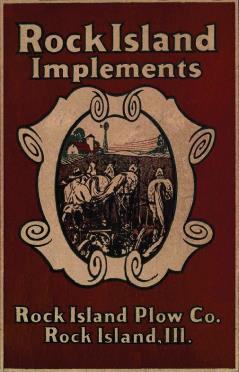
|
Below: Catalog 42 circa 1925? This catalog was scanned and is available free of charge by University of Illinois Champaign-Urbana. This scan is frequently seen in CD format on Ebay. It can be downloaded and read Here free of charge. |
|
Left: 1912 Rock Island Plow Co Cook Book (Click to download)
|
